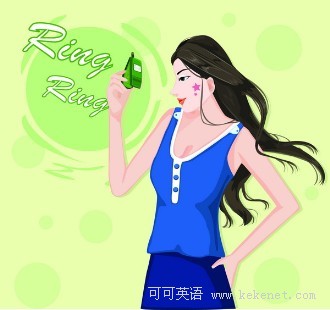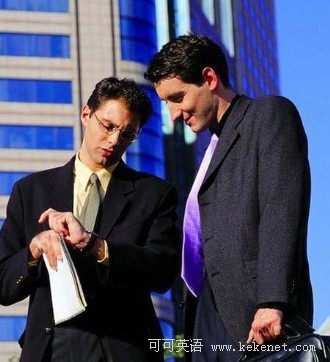(单词翻译:单击)

A picture of pear (yali) stands for “pressure”, which shares a similar pronunciation with the fruit in Chinese. One post-90s girl who goes by the online name of Xiao Wei, was taking notes of a meeting all in such type of slang which is popular with many young people. But she was out of “RP” (renpin), which means “luck” in online slang-speak: Her boss confused at reading her notes, gave her a real dressing down.
因为水果鸭梨与压力谐音,所以人们用鸭梨的图片代表压力。一位网名为小薇的90后女孩就选择用这种备受年轻人热捧的火星文做会议记录。可是小薇却没有那么好的RP(人品,在网络火星文中指的是运气的意思)——她的老板根本看不懂她写的是什么,并把她狠狠地批了一通。
Xiao Wei later posted her notes on the BBS of Chengdu.cn and stated her “grievances”: “I’m a post-90s girl and I use ‘post-90s style’ language, and for this I may get fired!”
随后小薇将会议记录发到成都全搜索的论坛上,并表示自己很委屈。她说:“作为90后,我喜欢用90后风格的语言。但这却可能让我被炒鱿鱼。”
Like Xiao Wei, many youngsters find that their use of trendy online slang, elaborate emoticons and wacky cell phone ring tones may not be appreciated in the workplace.
和小薇一样,许多年轻人发现使用火星文,各种复杂的表情符号以及怪异的来电铃声这种在职场中并不受欢迎。

Annoying ring tones
恼人的手机铃声
A survey on “workplace cell phone ring tones” by Zhaopin.com in March, 2009, asked around 5,000 respondents what ring tones they found most annoying. While loud ring tones were hated most, “indecent” and “wacky” ring tones came second and sixth respectively.
2009年3月,智联招聘网站曾针对办公室中手机铃声的使用情况做了一项调查。大约有5000名网友参与该调查,回答了他们心中最难以忍受的铃声类型。结果显示,吵人的铃声让人最难以容忍,不雅铃声,搞怪铃声分列第二、六位。
Besides annoying colleagues, such habits might also make people question your maturity and professionalism, according to Cao Yong, a finance manager at China Petroleum Engineering & Construction Corporation.
中国石油工程建设公司的财务经理曹勇(音译)表示,这种铃声除了会打扰到同事,还会让人觉得你不够成熟和专业。
“A lack of awareness regarding office rules and workplace etiquette causes workplace freshmen to bring inappropriate habits to the workplace,” said Cao. “They often behave no differently at work to how they behaved in school.”He attributes such behavior to an inability to switch from a school to workplace mindset quickly enough.
曹勇说:“职场新人们若忽视办公室规定或疏于职场礼节,就会把不良习惯带到工作中。这些新人往往进入职场后表现得和在学校时一样。”他将这些举动归咎于,这些新人的思维无法适应从校园到职场的快速转型。

Difficult task
严肃而艰巨地工作着
According to Cao, the first lesson for workplace freshmen should involve role playing. This will help them to hide their private-life personalities and “play” at being serious, professional members of staff in the workplace. However, many freshmen find this a difficult task.
曹勇表示,职场新人第一课的内容之一便是角色扮演。这会有助于他们将私下里的个性隐藏起来,然后在职场中“扮演”一个认真且专业的员工。然而,许多新人发现这并不是一件容易的事。
Edison Sun, 20, (who preferred not to tell her real Chinese name), is a researcher at a Shanghai-based firm of headhunters. She is a bubbly character who will always respond with a long string of “ha-ha” in online chats with friends. But she has been reduced to using no more than “” in office e-mails, and is forced to forgo her huge collection of cartoon emoticons and funny slang vocabulary.
今年20岁的孙小姐(不愿透露真实姓名)是上海一家猎头公司的研究员。她性格活泼开朗,平时和朋友上网聊天时她总是会敲击出一连串的“哈哈”。但现在她工作邮件中仅仅会使用几个笑脸符号,同时也不得不放弃大量搜集卡通表情以及搞笑网络语言的爱好。
“It’s totally not me. I don’t want to change my habits and fake like this,” Sun complained. “I should be respected as a professional if I can do my job and take care of business to a high standard.”
她抱怨道:“这简直都不是我了。我不想改变习惯,也不想伪装成这样。只要可以高标准地完成工作,我就应该被称赞为专业人士。”

Clear communication
清晰有效的沟通
Supervisors, however, are more demanding as far as the definition of workplace professionalism goes. “It is not about abandoning all your habits and being hypocritical. It’s about choosing the mode of behavior and expression that best suits each situation in order to ensure clear communication,” said Wang Han, deputy director of government affairs of Taobao.com.
然而,只要职场专业化的定义不断更新,企业主管们的要求也会越来越高。淘宝网政府事务办公室副主任王涵(音译)表示:“这并不是要员工放弃全部爱好并学会虚伪。之所以这样做是希望他们能在任何情况下都能选择一种最得体的行为表达方式,以确保清晰高效的沟通。”
Taking her own advice, Wang uses trendy slang to facilitate communication with her younger clients, while switching to more formal language in her dealings with older ones.
正是基于自己的建议,王涵开始使用潮流词汇从而加强和年轻客户的沟通。而在和年龄偏大的客户打交道时,她便会采取比较正式的口吻
Cao Yong warned that besides harming your professional progress, bringing “trendy” habits into the workplace may also give your boss a bad impression of you, and you may not even be aware of it.For example, Cao said he would question the work ethic and attitude of an employee whose signature was too cynical or maverick.
曹勇指出,把一些过于“时髦”的习惯带到工作当中,不仅会影响到你的职业生涯,还有可能会给老板留下坏印象,就连你也许都没有意识到这些后果。曹勇举例说,如果某员工的签名过于另类或者愤世嫉俗,那么他便会质疑该员工的职业道德和工作态度。
“After all, it’s generally accepted that it’s best to be serious and low-key in the workplace,” he concluded.
他总结道:“毕竟,人们普遍认为,在职场最好保持严肃认真、低调。”


